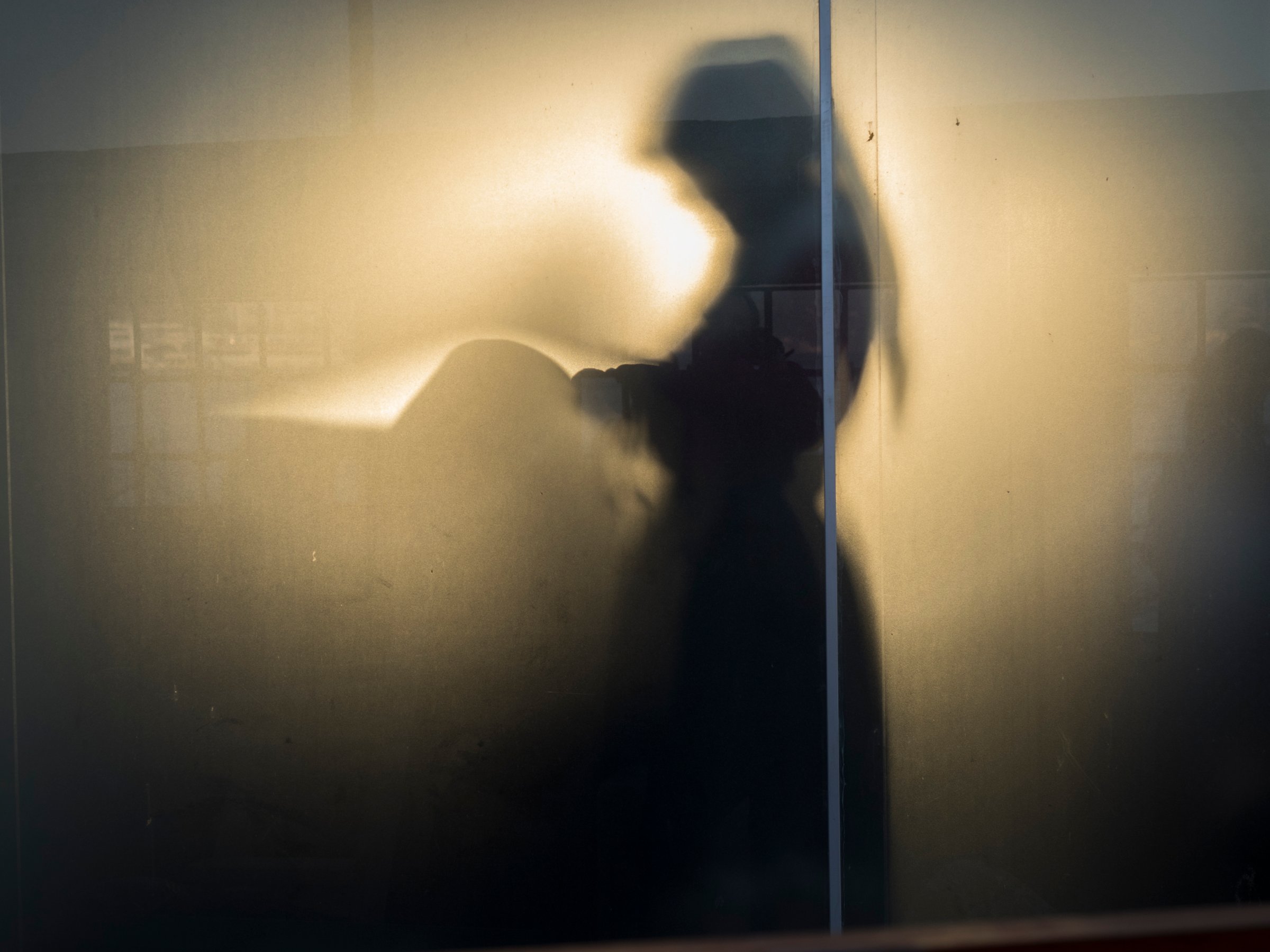
There is a flawed relationship between size and power. Bears and lions provoke fear, yet the mosquito is the more ferocious killer. Humans can be similar. Take Dian Yulia Novi. She stands less than 5 ft. tall, but her true power is in her will. And in the pressure cooker packed with explosives she planned to detonate at Indonesia’s presidential palace. Recruited online by the Islamic State (ISIS), she was determined to die as a martyr for global jihad. Until her arrest on Dec. 10, the 27-year-old was set to become the first female suicide bomber in the world’s most-populous Muslim-majority nation.
“In Islam, men and women are different,” she tells TIME in an exclusive interview at Kelapa Dua prison, south of Jakarta. “But now, jihad is mandatory for all Muslims, just like praying. Everyone must do jihad.”
Dian is friendly and chatty, wearing a long dark brown hijab and gray gloves, which occasionally bring a small bottle of eucalyptus oil to her covered nose. “For nausea,” she says. Only her dark, piercing eyes are visible through her full-face niqab veil, a habit she picked up during a stint as a migrant worker in Taiwan. That was also where she was radicalized online. Indonesia has battled for decades against homegrown Islamic extremism, but ISIS presents an entirely new challenge, inciting “lone wolf” attacks and propelling women into the front line for the first time. A few days after Dian’s arrest, another woman, Ika Puspitasari, was arrested for plotting a suicide bombing in the tourist island of Bali on New Year’s Eve. “Nowadays more men are hiding from waging jihad,” says Dian. “So why can’t a woman volunteer?”
The rise of ISIS comes as Indonesia’s fledgling, secular democracy is increasingly under threat from a resurgent Islamist right. While Europe has so far felt the brunt of ISIS-inspired terrorist plots, these forces threaten to turn the Southeast Asian nation of 250 million into a maelstrom of radicalization. In a 2014 survey, Indonesian scholar Al Chaidar recorded 2 million ISIS followers in Indonesia. More than 600 Indonesians are currently fighting with ISIS in Syria, helping to spread the group’s warped ideology to compatriots back home. Their goal is a Southeast Asian caliphate governed by Shari‘a, similar to that hewed in the dusty borderlands of Iraq and Syria by ISIS. And with more than 191 million Indonesian Muslims targeted by ISIS as potential recruits, the tiniest uptick in radical support could have hitherto unseen repercussions across the planet.
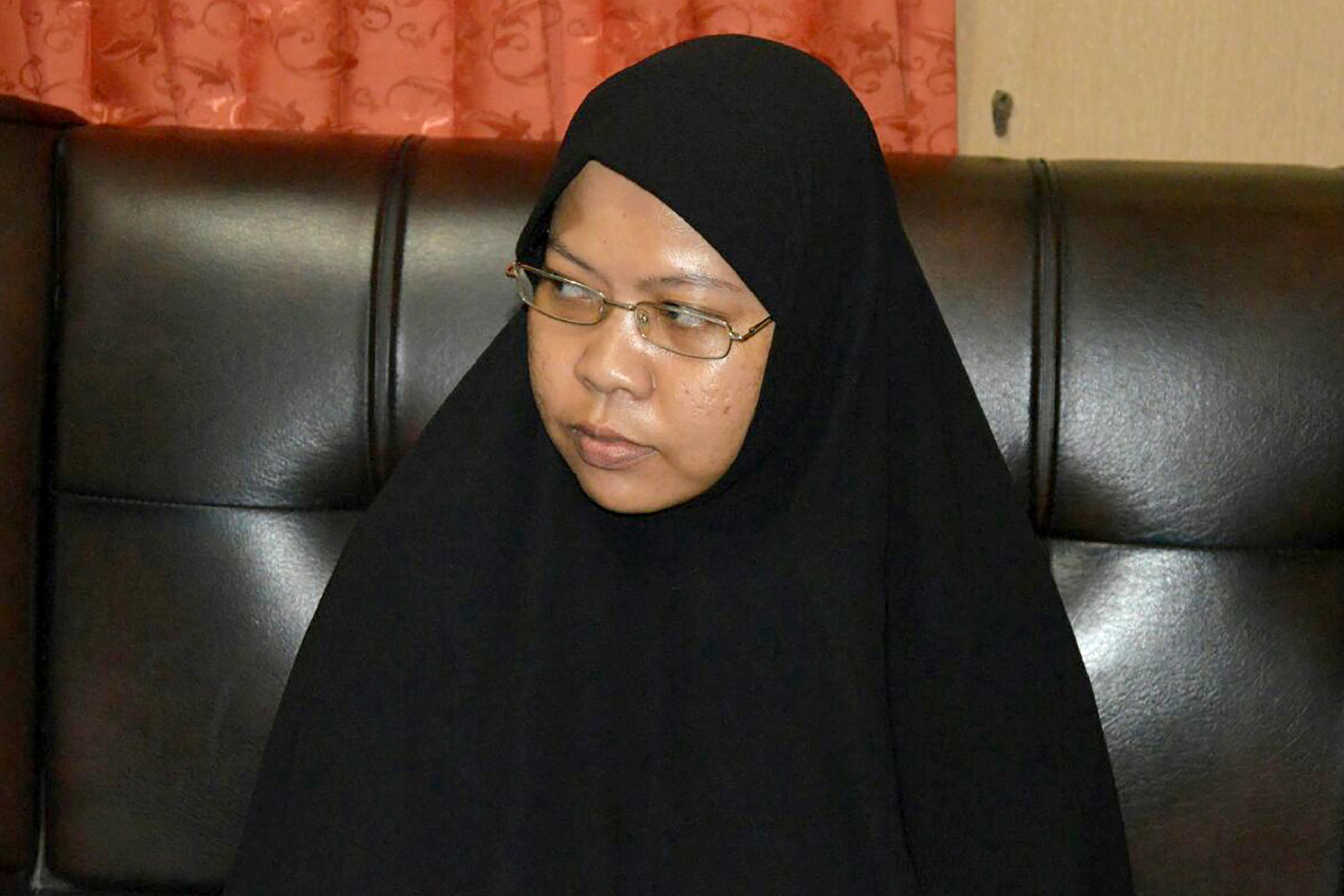
‘Maybe there are many Dian Yulia Novi’
Indonesia’s Islamists traditionally struck from jungle hideouts across its vast archipelago of 6,000 inhabited islands, mirroring the Pattani-Malay insurgents of Thailand and the Moro rebels of the Philippines. But in recent years, the nation’s burgeoning migrant worker community — toiling in factories and glitzy apartment buildings predominantly in Hong Kong, Singapore, Taiwan and Saudi Arabia — has proved especially vulnerable to online radicalization, with serious repercussions for global security.
“The challenge now is we can’t identify them,” says Siti Dorojatul “Dete” Aliah, director of Jakarta’s Institute for International Peace Building, who has interviewed more than 50 female jihadis. “Maybe there are many Dian Yulia Novi scattered around Indonesia. We don’t know how to approach them because they don’t belong to any groups.”
In January last year, five ISIS devotees attacked a Starbucks in central Jakarta with bombs and guns, leaving seven dead including the attackers. In July, a botched suicide bombing at a police station in central Java killed the attacker and injured one officer. In November, police foiled a plot to bomb the Myanmar embassy in Jakarta. These attacks broke seven years of relative calm since the last major attack by Jemaah Islamiyah (JI), Indonesia’s al-Qaeda-affiliated terrorist group. But now new recruits — often self-indoctrinated online like Dian — are being targeted by fanatical JI splinter cells. Three such groups have claimed to represent ISIS in Indonesia, of which the most prominent is Jamaah Ansharut Daulah (JAD).
Read More: ISIS Opens a New Battlefront in Asia With Jakarta Attacks
JAD ensnared Dian. But her jihad ended unsuccessfully after a raid by Indonesia’s elite antiterrorism squad, Detachment 88, at the boarding house she had rented three days earlier in the Bekasi district, east of Jakarta. “JAD has a network in Bekasi,” Detachment 88 chief Edi Hartono tells TIME in a rare interview. Dian’s landlord, who asked to simply be called Andy, didn’t suspect anything untoward when this slight young woman paid cash for Room 104, around 20 sq m of whitewashed walls and Finding Nemo bathroom tiles. And he certainly didn’t expect the monumental cleanup job around the corner. Dian kept largely to herself, each morning pottering across to the small warung, or eatery, opposite the building that dolls out bowls of mung-bean porridge. “But we did notice five strange men hanging around the warung next door,” Andy tells TIME, surveying the spot where a controlled explosion demolished half his wall.
Those men were Detachment 88 officers, who had been monitoring Dian for some time. When she went to a nearby post office, they followed and retrieved the package she mailed to her parents in their hometown of Cirebon in northwest Java. It contained some clothes and her will, which simply said she had left them “to do good deeds.” The officers then followed Dian as she was driven by two men back to the boarding house, exiting the car with a black backpack. When the officers knocked on the door, Dian was reading the Quran. “The bomb arrived in the morning, and the police arrested me that same day,” she laughs.
Dian — like disaffected young Muslims the world over — was radicalized online, but she had some very real-world conspirators. One was Nur Solihin, who was recruited by Bahrun Naim, the most infamous Indonesian fighting with ISIS in Syria. Bahrun is JAD’s chief provocateur and he ordered Nur Solihin to find a “bride” for a suicide bombing. He also gave the order for Dian to attack the presidential palace during the changing of the guard. The bomb contained the explosive materials triacetine triperoxide and glycerin, designed to send the accompanying 3 kg of 5-cm nails barreling through flesh up to 300 m away at 5,300 m per second. A similar device was used in the Boston Marathon bombing of April 15, 2013, which claimed three lives and injured hundreds more. “Presidential security protects the President, who applies the law created by people,” says Dian. “They replace the Quranic law with human law. Do you think that’s not breaking Shari‘a?”
The call for Shari‘a to be implemented in Indonesia represents a challenge to its secular founding tenets. Since the end of colonial rule in 1945, Indonesia’s leaders have guarded against religious extremism through the state ideology of Pancasila — belief in one God, a just and civilized humanity, national unity, democracy through deliberation, and social justice for all. But Islamist groups that were repressed, often brutally, under postcolonial authoritarian governments have become louder and more influential since democratization in 1998.
The most prominent of these is the Islamic Defenders Front (known by its Indonesian initials FPI), which has taken to the streets in recent months in an attempt to oust Jakarta’s governor, Basuki Tjahaja Purnama, who is an ethnic Chinese Christian. Popularly known by his Hakka nickname Ahok, he is fighting a blasphemy charge after he told a crowd that they had been “lied to” by hard-line Muslims, like FPI’s firebrand leader Rizieq Shihab, who cite a Quranic verse as supposed proof that Muslims should not have a Christian leader. “Today, Islamist groups like FPI are the most influential part of Indonesian civil society,” says Sidney Jones, director of the Jakarta-based Institute for Policy Analysis of Conflict (IPAC). “For a democratic society, that’s very frightening.”

‘They are ready to die’
For Indonesia’s police chief Tito Karnavian, groups like FPI are troublesome because, he says, members can easily make the jump into terrorist groups or become lone-wolf attackers. “FPI talk about establishing Islamic Shari‘a in Indonesia, and this is also one of the objectives of terrorist groups,” he tells TIME over coffee and cake in his Jakarta home. “They want to create a caliphate — Daulah Islam — so they have a common interest. They both think the state apparatus is the enemy.”
Tito is Indonesia’s real-life action hero. Less than a week after becoming the nation’s top cop in July, he joined a special task force that killed Indonesia’s most-wanted terrorist, Santoso, in the steamy jungle of Central Sulawesi province. He previously led the national counterterrorism agency and Detachment 88, where he helped dismantle the JI network after the 2002 Bali bombings, and in 2010 launched a raid on a militant training camp in Aceh, which led to the arrest of JI founder Abu Bakar Bashir and chief JAD ideologue Aman Abdurrahman. Enormous posters of Tito in military fatigues hang outside police stations across Indonesia. “I’ve done all types of police work, including murder, then armed robbery, then drugs. But terrorism is the apex of criminality,” he says, eyes suddenly sparkling. “Because they are ready to die and are actually seeking death.”
It would be wrong to characterize Indonesians as overly prone to radicalism. Despite the several hundreds fighting with ISIS in Syria, proportionally they are one of the least represented nations: just two ISIS fighters per million of population, compared to 27 for Denmark or 40 for Belgium. But Indonesia’s sheer size means even a slight increase could have calamitous consequences. And for Tito, the U.S. drawdown in the Middle East, combined with Russia’s increasingly prominent role supporting embattled Syrian President Bashar Assad, spells problems — perhaps leading to the end for ISIS in the Middle East. While that is, of course, desirable per se, it would likely mean hundreds of battle-hardened fanatics swarming home. “The threat, of course, is considerable,” says Tito. ”Firstly, because the radical mind-set is already in place. Secondly, the military capability.”
Indonesia has weathered such storms before. But while only 197 JI operatives joined al-Qaeda training camps across Afghanistan and Pakistan, returning home following the U.S.-backed invasion, more than three times that number fight with ISIS today. Says Tito: “So you see the magnitude of the threat.”
Read More: Overseas Money Is ‘Financing Terrorism in Southeast Asia’
One augmented by the influence of oil-rich Saudi Arabia, which is the biggest exporter of religious education to Indonesia today. Many millions of Saudi dollars are funneled into institutions that preach its very conservative, literal brand of “Wahhabi” Salafism. This stokes animosity toward other faiths and branches of Islam, especially Indonesia’s 2.5 million-strong Shi‘ite community, which has increasingly fallen victim to sporadic violence. Former U.S. President Barack Obama, who attended SDN Menteng 01, a public elementary school in Jakarta, from 1969 to ’71, has described his dismay as Indonesia’s relaxed, pluralistic Islam has gradually stiffened into a more fundamentalist, uncompromising version since an influx of Saudi cash in the 1990s. FPI, for one, is modeled on the Saudi religious police, performing a similar role as overbearing moral guardian. FPI leader Rizieq attended the Saudi Islamic and Arabic College of Indonesia in Jakarta before gaining a Saudi state scholarship to continue his studies in Riyadh.
High-profile groups like FPI do not openly advocate terrorist acts, though they are far from a passive force. Tito has even accused Bachtiar Nasir, chairman of the National Movement to Safeguard the Indonesian Ulema Council’s Fatwa (GNPF-MUI), the key backer of anti-Ahok protests, of embezzling funds for a pro-ISIS group in Turkey. And other than organizing enormous public demonstrations, FPI is one of Indonesia’s leading proponents of “sweeping,” which refers to supporters gathering around businesses to harass staff and customers against behavior that is contrary to Shari‘a, such as consuming alcohol or employing female staff in what FPI considers skimpy attire.
Sweeping has often been used by shady business owners, who pay mobs under the guise of religious righteousness to undermine competitors. FPI’s own sweeping has even extended to shops that requested Muslim employees to don Santa hats in the run-up to Christmas. Encouraging vigilante action to enforce societal piety can be taken to the next level by radical elements. “I’m here because I want to defend Islam,” says Al Fatih, 15, from Depok district south of Jakarta, at an FPI rally outside the Jakarta police headquarters in late January. Asked whether he would defend Islam abroad, Al Fatih doesn’t hesitate: “Of course.”
‘I was curious about some accounts that liked jihad’
Indonesia is the world’s fourth-most populous country, and about 4.5 million citizens — mostly women — work overseas as migrant laborers. A reputation as smart, friendly and industrious means many are invited into private homes as domestic helpers. They enjoy fast-tracked visa applications, though a lack of protections mean they are frequently victims of physical, mental and sexual abuse. Laboring for long hours and estranged from friends and family, many seek solace and companionship in online forums. Some, like Dian, want to learn more about Islam but stumble upon extremist doctrine. No attacks have so far been launched in host countries, but that may change. In July, Detachment 88 foiled an elaborate plot to strike Singapore’s plush Marina Bay Sands hotel and casino complex with an offshore rocket (Bahrun is believed to have been the orchestrator). Singaporean authorities said in December that they had deported almost 70 suspected radicals over the past two years. “There are basically radical cells in most Indonesian migrant communities abroad,” says Jones.
Dian says she never communicated with local ISIS supporters during her time as a migrant worker. In 2011, she worked as a maid looking after the younger children of a high school teacher in Singapore, earning $150 a month. Her favorite child was called Ye Ye. “She was 5 years old,” Dian recalls fondly, “She was this cute, chubby Chinese kid.” But when her employer decided to move to China, Dian chose to go home, fearful of the cold weather. Then in 2013 she took a job at a retirement home in Taiwan, where she quadrupled her previous salary. She says the home’s managers were “tolerant” and didn’t object when she began wearing a full-face niqab. But a combination of long hours and more disposable income meant she spent more time engrossed in her snazzy new smartphone. “Like any young person, I used social media like Facebook,” says Dian. “I was curious about some accounts that liked jihad. So I spied on them and sent messages. Some of them replied me, some did not.”
Attack in Jakarta: Bombs and Gunfire in Indonesia's Capital
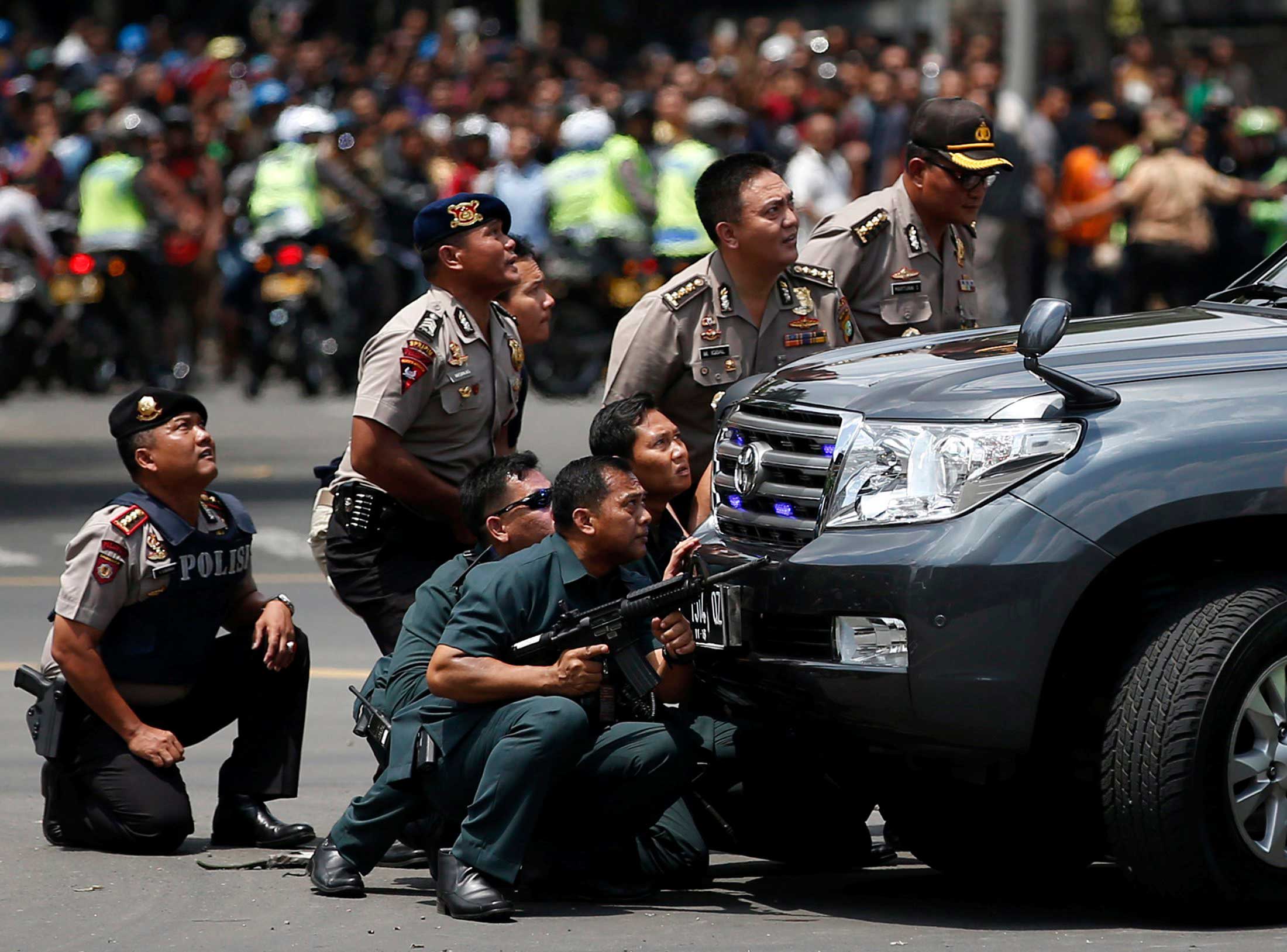
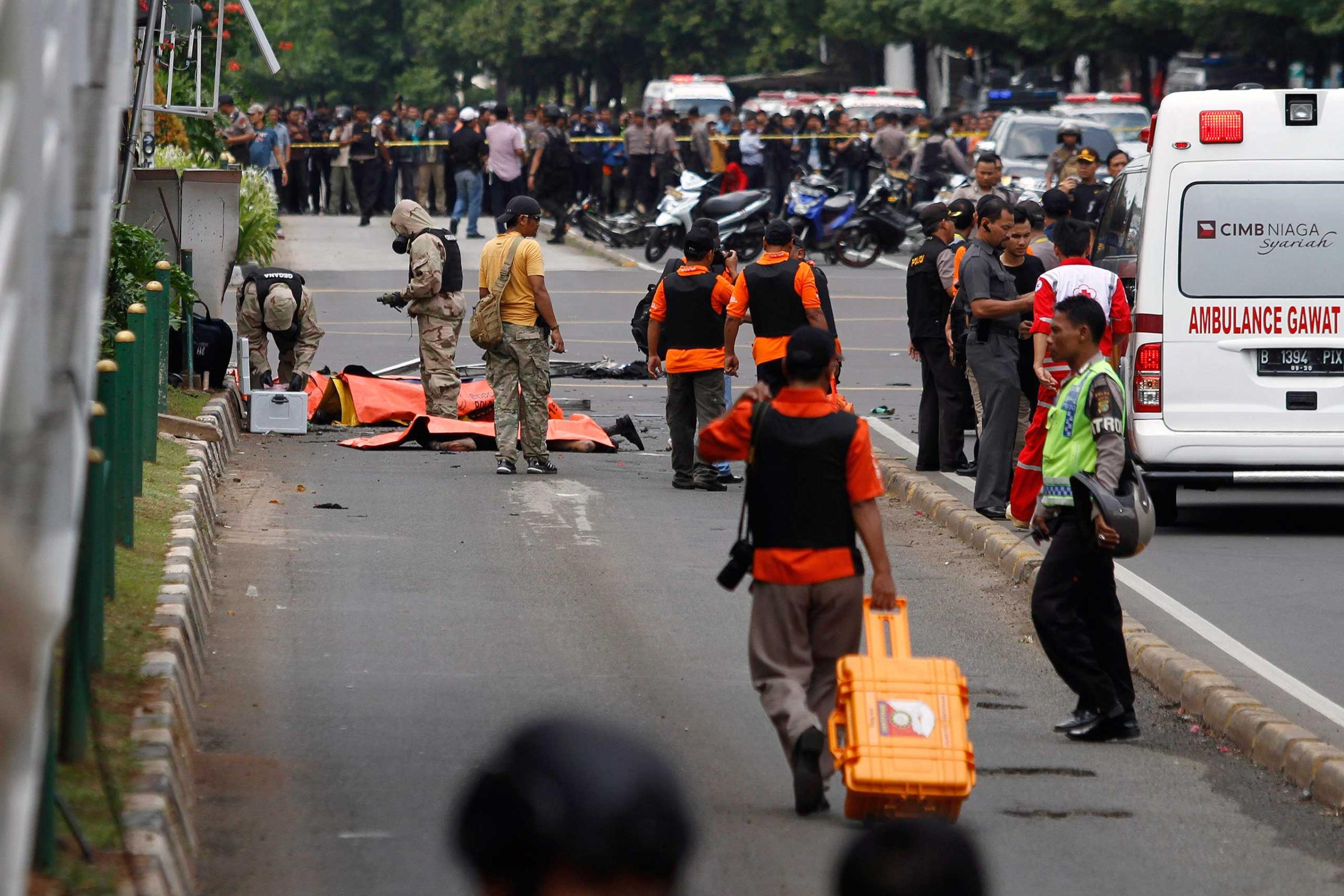
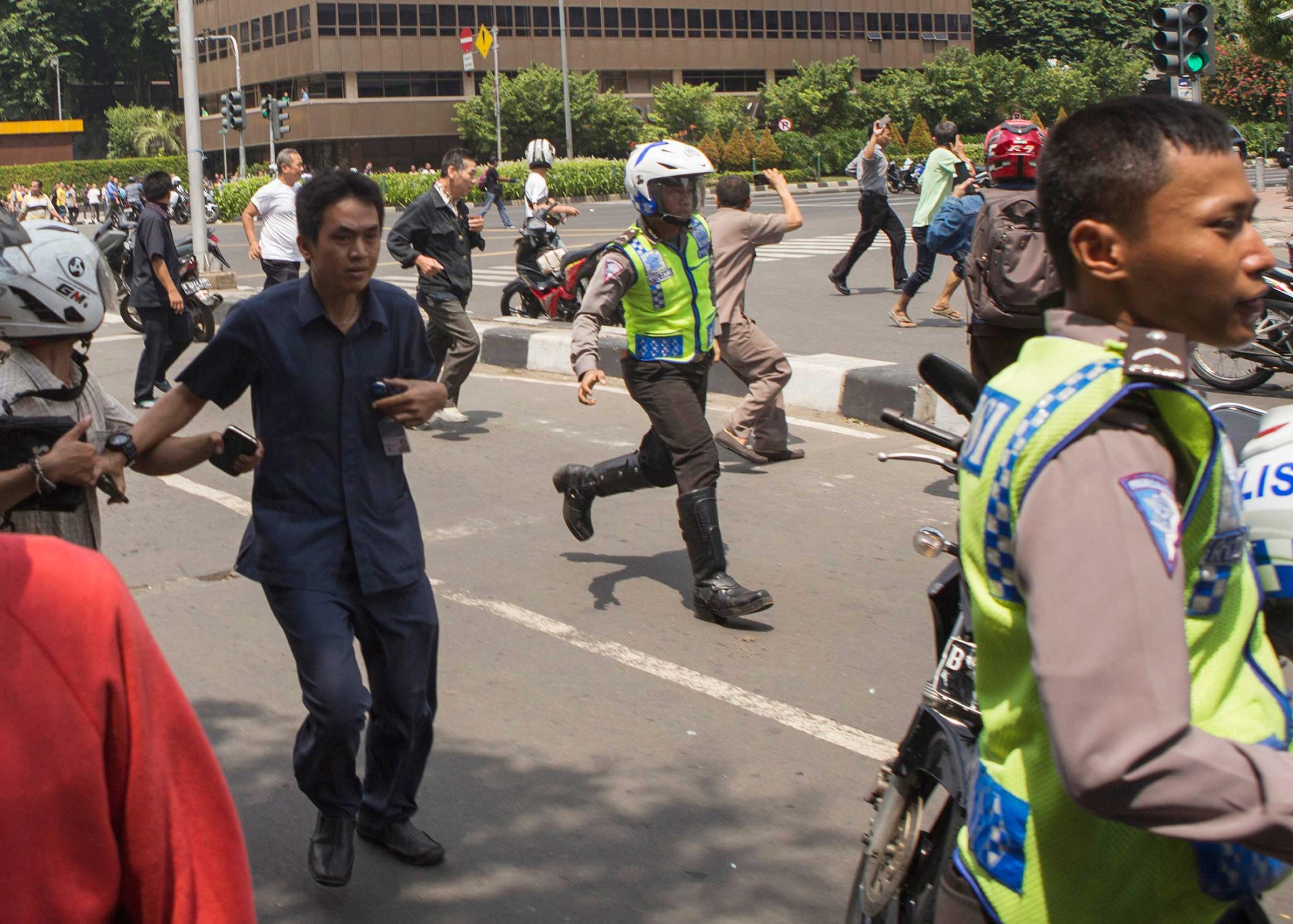
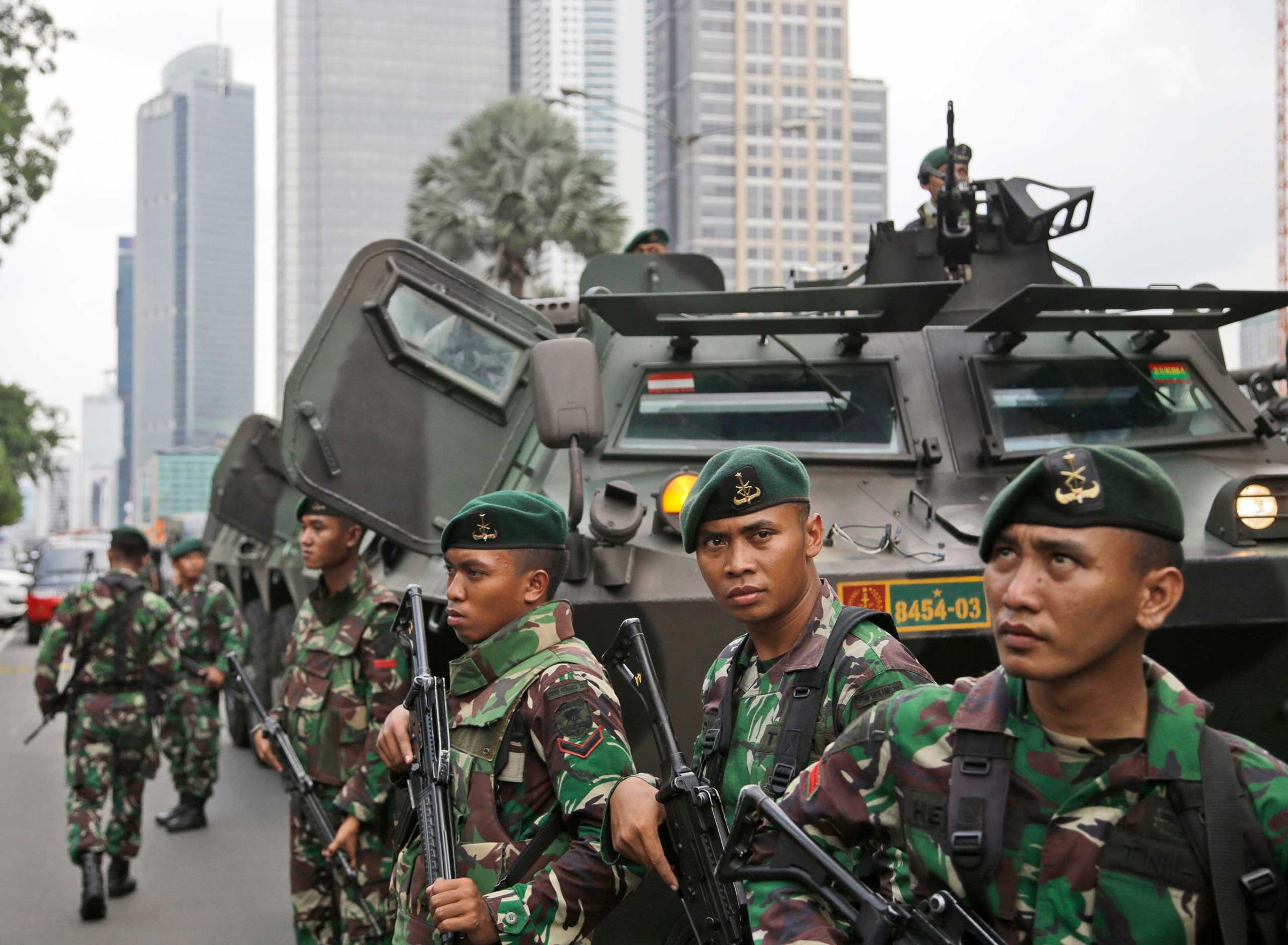
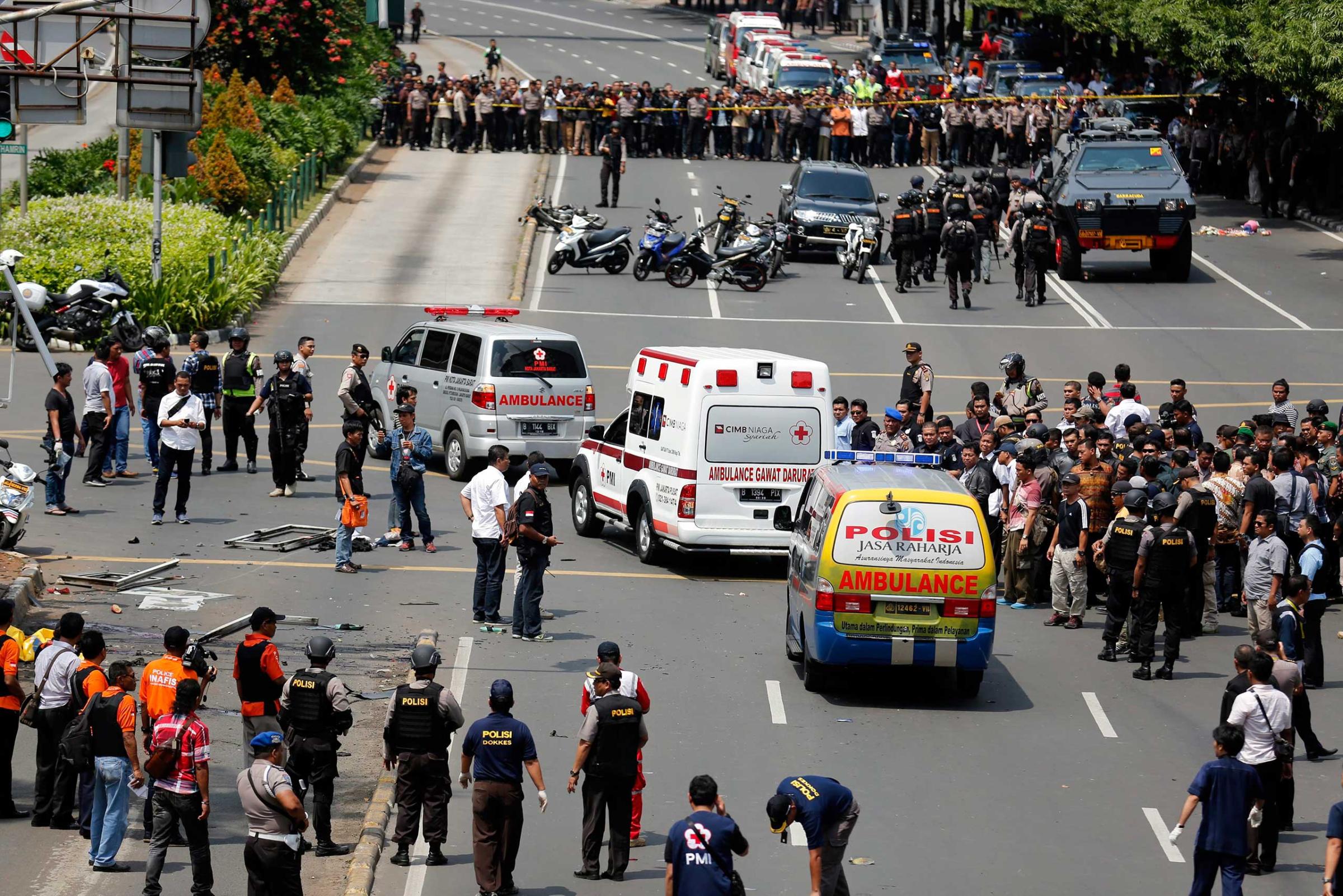
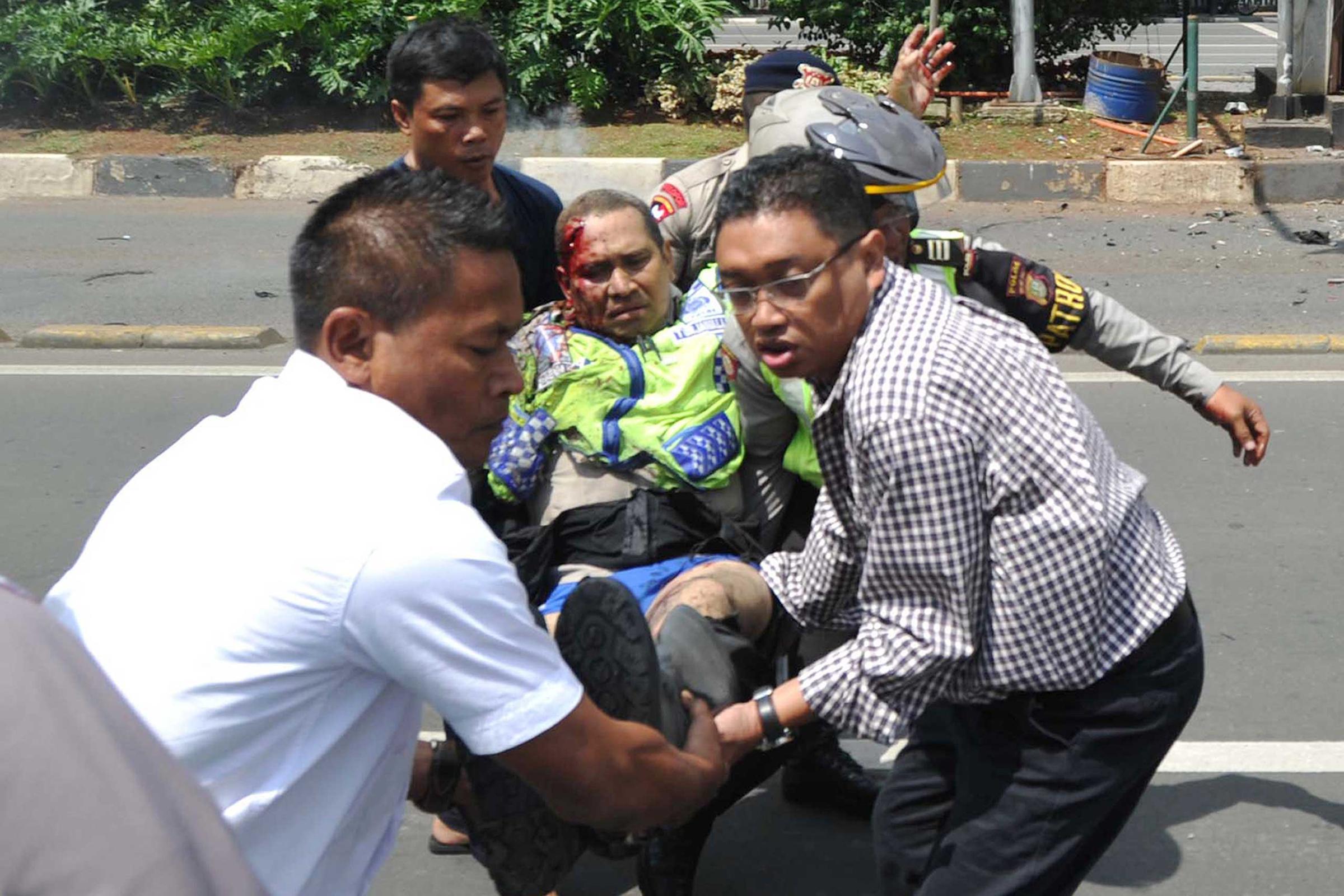
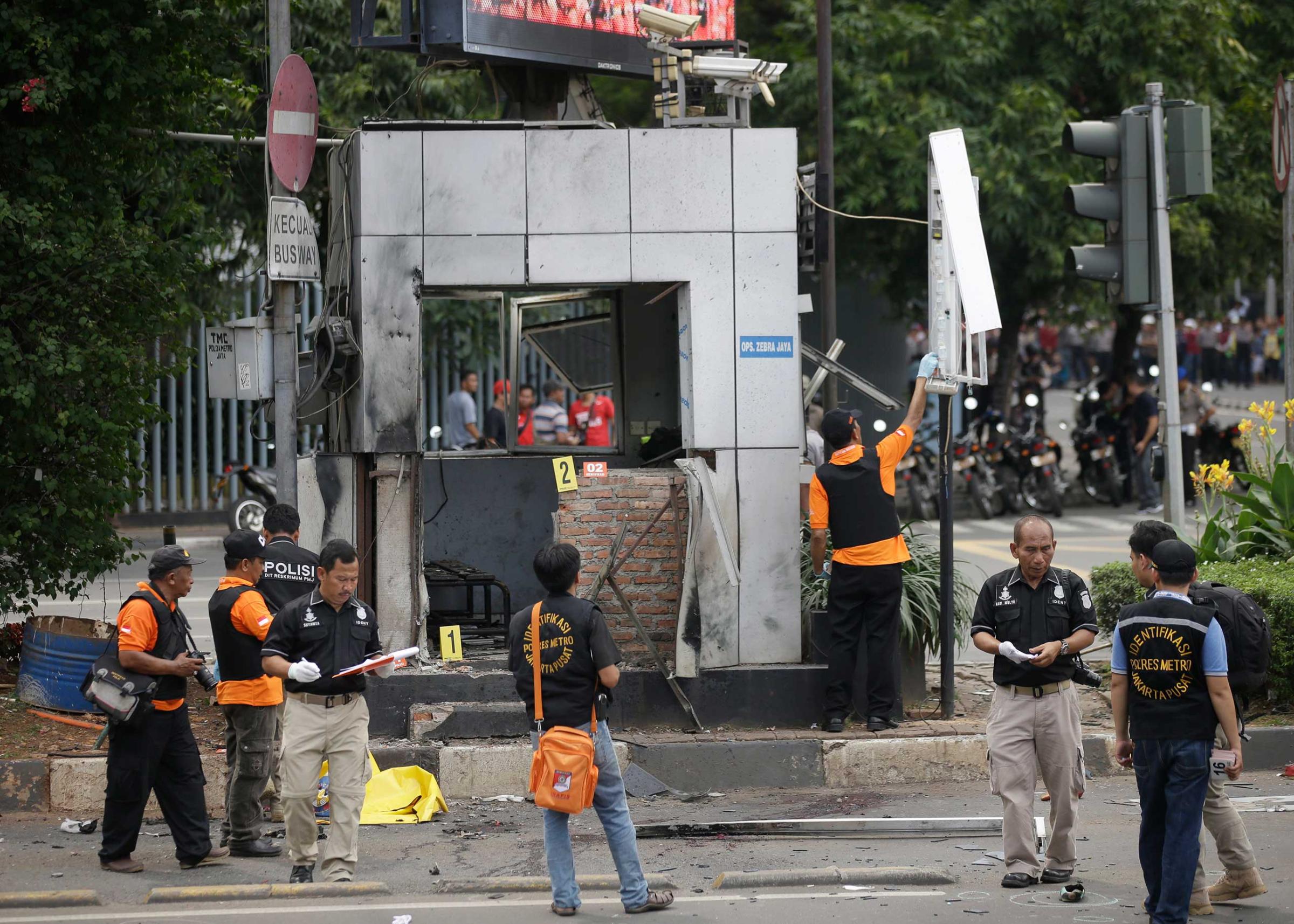
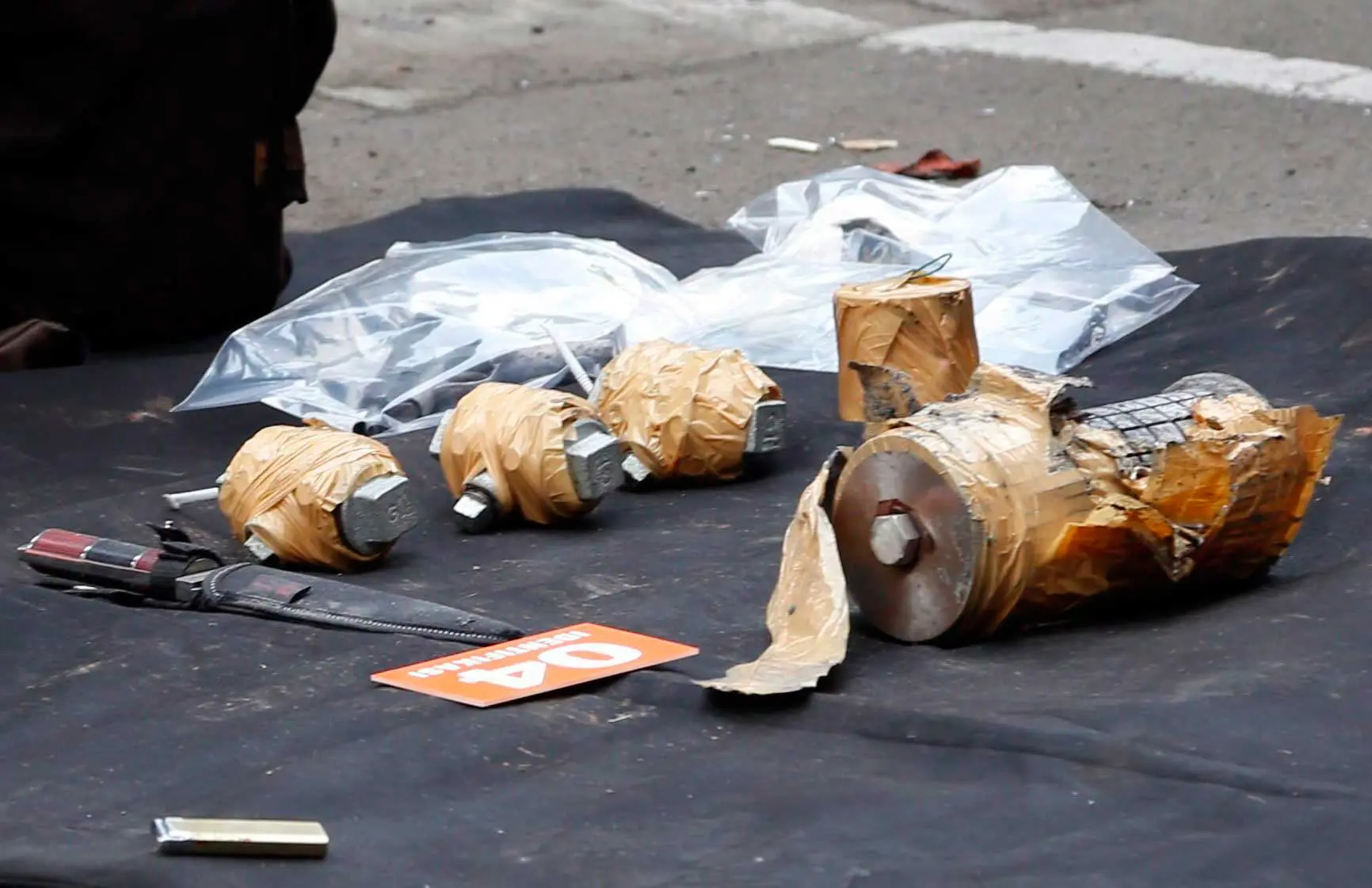
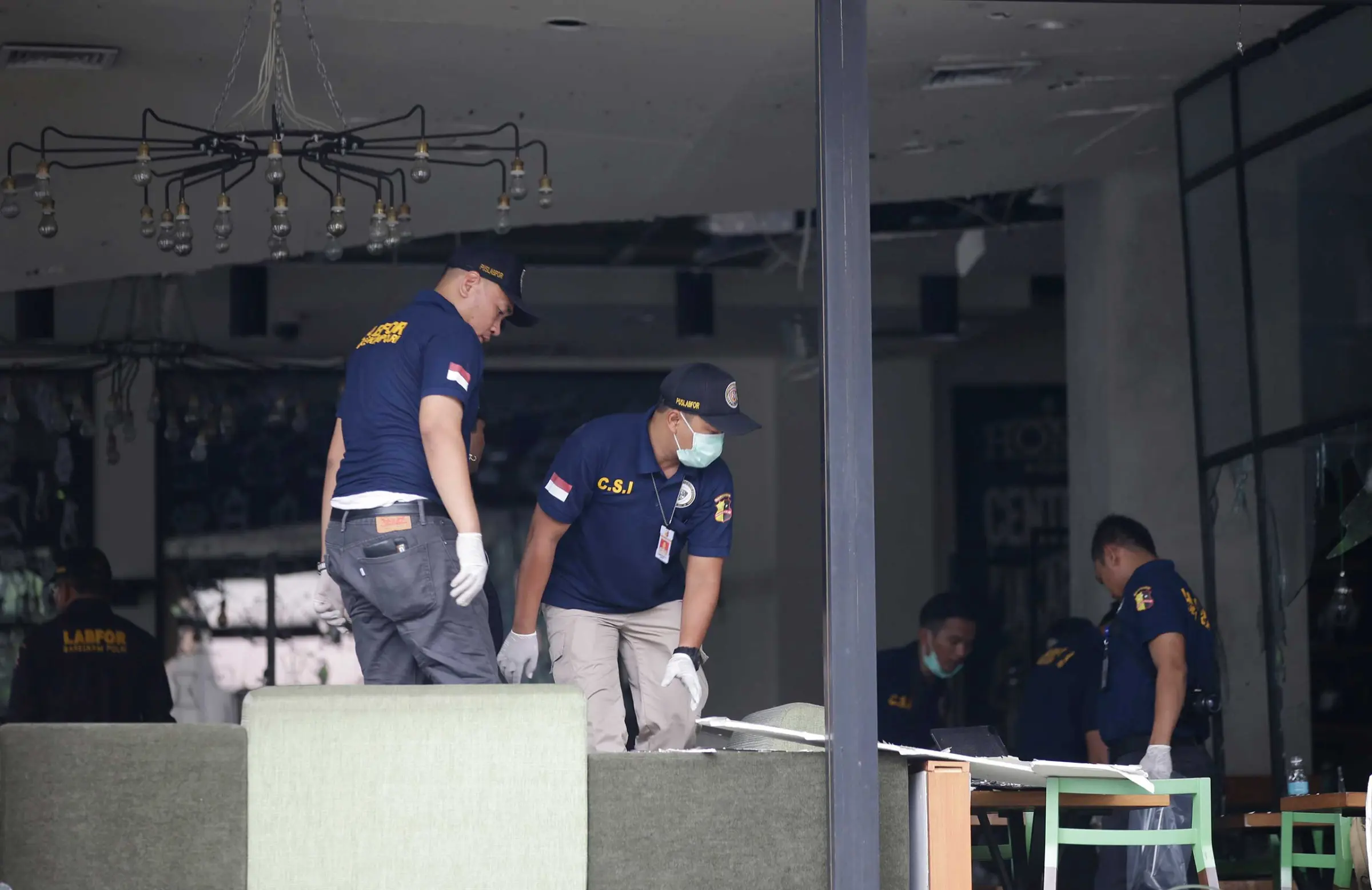
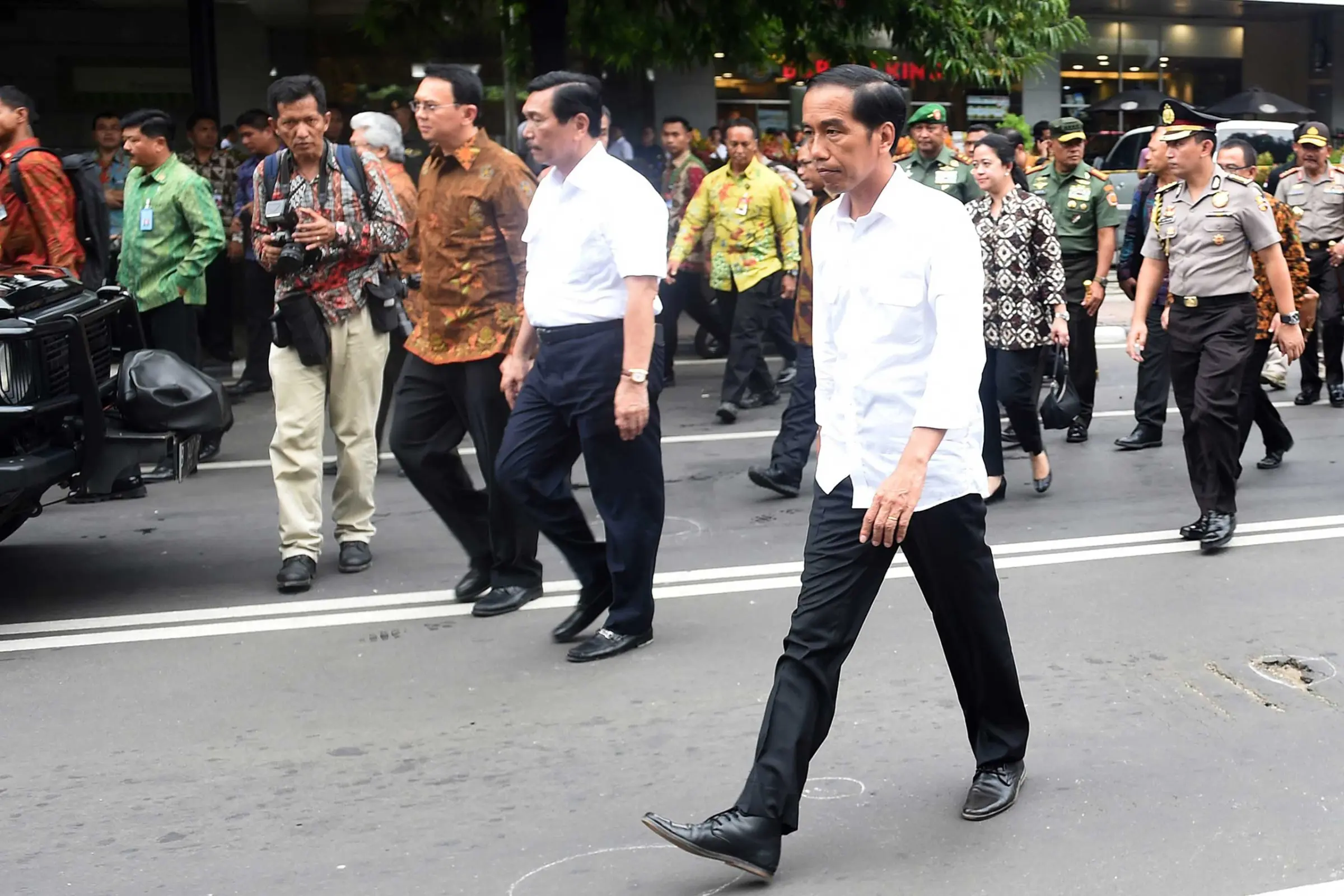
The first account that did reply was a woman who lived in Syria. She struck up a rapport with Dian, and, via other like-minded ISIS sympathizers, that led her to talk with Nur Solihin. After Dian agreed to be a suicide bomber, they got married using the popular Telegram messaging app. According to Shari‘a, there’s no requirement that a woman has to attend her own wedding ceremony. “I’d never met my husband before,” says Dian. “We decided to get married not because of the caliphate but we have the same intention to do jihad.” The two had never even exchanged photographs.
Nur Solihin was already married to another woman, though she apparently didn’t raise objections to the new match. “I don’t think so,” laughs Dian when asked about the other wife’s reaction. “I met her and everything was just so-so.” When Dian returned to the boarding house, Nur Solihin and another conspirator, Agus Supriydi, drove their Daihatsu Ayla to scope out the presidential palace, picking out an area near a bus stop where Dian would set off with her bomb. They then drove back to join Dian but were arrested by Detachment 88 en route. Dian and Nur Solihin had only met three times.
It’s one of the many contradictions of ISIS that a group whose medieval precepts prohibit innovation utilizes technology so deftly. Practically every social app on the market is used to communicate and share the group’s eschatological propaganda, from Twitter and Facebook to messaging platforms — encrypted and otherwise — like Telegram, Surespot, Threema, Kik and WhatsApp. But apart from Hollywood-esque videos and bomb-dropping drones, social media is frequently used to perform jihadi weddings. This brings women into their traditional jihadi support roles, as the wives, sisters and mothers of male actors. However, ISIS’s distorting of ideology has conferred a murderous promotion. In Syria, ISIS has an all-female al-Khansaa Brigade that operates as a religious police. “ISIS used women because they want to shame the men,” says Dete. “They say, ‘If women can do jihad, what about you guys?’”
Despite their front-line roles, Dete still considers women like Dian victims, given that they are not involved in the plotting of attacks or even selection of targets. Because while the Internet is a useful tool for recruiting willing martyrs, the key players retain their links to Indonesia’s storied ideologues. And they typically hail from one place: the central Java city of Surakarta, commonly known as Solo. Nur Solihin used to run a radical Islamist blog here, while Agus Supriydi is also a local. The sprawling city of 500,000 is the home of Indonesian President Joko Widodo, popularly known as Jokowi, a former carpenter who first grew to national prominence by becoming its mayor. But Bahrun is another famous Solo son, and the city has an undisputed reputation as ground zero for Indonesia’s jihadist movement.
‘Maybe there’s one or two good things about them’
Al-Mukmin Islamic boarding school is home to 1,300 children in Solo’s Ngruki neighborhood. The boys’ classrooms and dormitories ring soccer and basketball courts, while on the opposite side of a large central mosque are the single-story girls’ quarters, which flank a leafy garden of caladium and gold capella. All students learn Arabic and English, which they are keen to practice with peculiar Western visitors, firing off questions as bubbly and boisterous as teenagers anywhere. There is genuine affection between pupils and teachers, who jovially goad their more timid charges to join in. Classwork lines the corridor walls, including one school project on Bali, Indonesia’s majority Hindu tourist island of Eat, Pray Love fame. “Bali is known for its beaches,” writes the tidy copperplate script. “Kuta and Legian are a paradise for surfers and known for their funky nightlife zone.”
That nightlife was shattered on the evening of Oct. 12, 2002, when three bombs ripped through the center of Kuta, killing 202 people and injuring 209 more. It remains Indonesia’s worst terrorist attack. Almost half the dead were Australian tourists. A recorded voice message purported to be al-Qaeda leader Osama bin Laden claimed the bombings were retaliation for Canberra’s support for the U.S. war on terrorism and assisting East Timor’s liberation from Indonesian rule. But the perpetrators came from closer to home: nine of those linked with the attack were graduates from Al-Mukmin, including the ringleader, Ali Ghufron (alias Muklas), who was one of three conspirators eventually executed.
Al-Mukmin was founded by Abu Bakar Bashir, considered the spiritual head of JI. Bashir was jailed for supporting terrorism in 2011 and publicly pledged allegiance to ISIS leader Abu Bakr al-Baghdadi three years later. Former Al-Mukmin teachers include Riduan Isamuddin, better known by the nom de guerre Hambali, the former JI military leader currently in extrajudicial detention at Guantanamo Bay. Five Al-Mukmin graduates were involved in the 2003 Marriot hotel bombings in Jakarta and another blew himself up in the 2009 Jakarta attacks. The International Crisis Group has dubbed the school the “Ivy League” for Indonesian jihadists.
Abdul Rahim, the son of Abu Bakar Bashir, now runs Al-Mukmin and tells TIME he’s “confused” by its reputation. “We have explained that this school has nothing to do with terrorism,” he says. “They committed those acts unbeknownst to the school.”
Arriving for our interview astride a chuntering motorbike, Rahim looks younger than his 40 years, and carries himself with the relaxed air of a man whose future holds no greater tribulations than his past. That is perhaps unsurprising. According to a U.N. Security Council resolution, he was a key al-Qaeda operative in Pakistan and Afghanistan during the late 1990s and early 2000s and was “present at a meeting of selected 9/11 hijackers in Afghanistan in May 2001 and likely participated in making the videos of their last wills and testaments.”
Rahim tells TIME that he has no terrorist connections. However, he admits that Al-Mukmin’s curriculum is the same from when his ISIS-supporting father was in charge. “We teach [students] to love the religion, Shari‘a, and to fight for and uphold Shari‘a, so nothing has changed,” he says. Regarding ISIS, he insists he is opposed to its caliphate. “We’ve always stated that we reject ISIS. The problem here is we found one or two teachers have a different opinion [about ISIS]. I think that’s their right. But what we should deliver by good teaching is telling the truth. So the students can see whether is it really good or bad … We cannot say that all members of ISIS are bad at all; maybe there’s one or two good things about them.”
Such equivocation is hardly reassuring. According to Tito, while there is nothing wrong with Al-Mukmin’s curriculum, “extracurricular activities are a problem.” Tito says the school preaches a Salafi jihadi ideology whereby an extra pillar is added to the universal five pillars of Islam: jihad. Sure enough, slogans dotted around the campus read: “Jihad Is Our Way of Life” and “Jihad Is Right if It Frees the People.”
Jihad as a concept has many interpretations, including the spiritual struggle within oneself against sin, and the fight to do good deeds to promote Islam. However, says Tito, “Jihad for them is only interpreted in one form: war and violence. And since jihad is compulsory then failure to do it is a sin against God. Whether ISIS supporters or al-Qaeda supporters in Indonesia, everyone in the radical communities agrees that Syria is legitimate grounds for jihad.”
Read More: Where Memes Could Kill: Indonesia’s Worsening Problem of Fake News
Jihad at home is different matter, and the major break between ISIS and domestic jihadi groups such as JI — and even al-Qaeda — is their attitude toward intentionally killing Muslims. For traditional jihadists, that is a red line. But the takfiri ideology of ISIS — which is distinct from but complements Salafi jihadism — brands all those who fail to pledge allegiance to its caliphate apostate and thus kafir, or “unbeliever.” Takfiris also believe that anyone who deliberately kills himself (or herself) while attempting to slay enemies of Islam is a martyr and goes straight to heaven. All sin is absolved with martyrdom, conveniently making the indiscriminate killing of noncombatants licit. For Dian, even her parents — local traders who raised her as a Muslim and enrolled her in pengajian, or Quran-reading, classes — are today’s kafir. “My family is very wise. All their advice is touching, and all is priceless,” she says. “[But] my parents in terms of praying were not really practicing.”
And so Dian had few qualms about detonating her pressure-cooker bomb at the presidential palace on a car-free Sunday afternoon with multitudes of families milling by. “We were not targeting Muslims,” Dian insists. “We were targeting kafir.”
‘A way station to further glory’
Visitors to Semarang prison in north-central Java file into a long room with a row of rickety wooden benches beneath a window of metal bars and chicken wire. Prisoners appear across this divide in a visitation chamber that doubles as a laundry room; rows of drying T-shirts and underwear swing about their chattering heads. Endro Sudarsono, the spokesperson for Laskar Umat Islam Solo (LUIS), a popular Islamist group similar to FPI, has been here since Dec. 20 when he was arrested with seven others while “sweeping” a bar in central Solo. “They say I will be here for six months,” he tells TIME. “But we will continue this activity when we get out.”
Endro says he also attended FPI protests against Governor Ahok in Jakarta, illustrating the blurred edges among these groups. It’s common to be a member of several, with splinters forming when individuals disagree with a particular facet of ideology or tactics. Endro, for example, is the spokesperson for LUIS but also teaches mathematics at Al-Mukmin. Nur Solihin belonged to terrorist group JAD and also a local Islamist group in Solo called Azzam Dakwah Center, of which ustad Sholeh, the Islamic-studies teacher at Al-Mukmin, is a leading member. (According to Detachment 88 chief Hartono, “Azzam Dakwah Center is a cover for JAD.”)
Read More: Indonesia’s Overcrowded Prisons Are a Breeding Ground for Islamic Extremism
Prison is a cauldron where these Islamist groups can mingle and radical ideology ferment. Jailed fanatics use fatwas and other pressure to stop fellow inmates joining deradicalization programs. Pro-ISIS ideologue Aman Abdurrahman, imprisoned on Indonesia’s Alcatraz-like Nusakambangan prison island since the 2010 Aceh raid, has published several books from behind bars that are considered de rigueur for aspiring jihadis. These tomes are then reproduced on extremist websites, where they are afforded a heft almost of scripture. A die-hard takfiri, Aman has forbidden his followers from cooperating with “kafir” institutions like the government, police or prison officers. Understaffed and poorly paid, guards are too intimidated to intervene. “Our interviews reveal that for Indonesian jihadists, a spell in prison, rather than being an intervention stage, is seen as a way station to further glory,” reads a recent report by the Brookings Institute. “Many leave prison not only unreformed, but also more influential in local jihadi circles.”
The pro-ISIS screeds of prison radicals often home in on U.S. foreign policy. Most recently, that has included U.S. President Donald Trump’s attempts to ban visitors from seven Muslim-majority countries. According to Cameron Sumpter, an Indonesian terrorism specialist at Nanyang Technological University in Singapore, the ban “should be seen as a gift to ISIS and the broader jihadi movement.” Dian is quick to agree. “It’s good that Donald Trump exists,” she says. “We know now that America is the real enemy. There will be a war between Muslims and the USA.” Asked about the Muslim ban, she laughs: “If it proves impossible [to implement], then we can destroy America.” Would Dian detonate a bomb overseas? “Sure, we can do that.”
Sequestered in Kelapa Dua prison, Dian is no longer a threat to anyone, though she has other things on her mind: like being three months pregnant. Normally a vegetarian, she now tucks heartily into a bowl of bakso — meatball soup. One of those fleeting encounters with her new husband, while they plotted the deaths of innocents, sparked life. “Thanks be to God,” she says. It has also likely spared Dian the death penalty. One more life that was to be sacrificed for the caliphate — though one that has now saved her own.
— With reporting by Febriana Firdaus / Jakarta, Semarang, Solo
More Must-Reads from TIME
- How Donald Trump Won
- The Best Inventions of 2024
- Why Sleep Is the Key to Living Longer
- Robert Zemeckis Just Wants to Move You
- How to Break 8 Toxic Communication Habits
- Nicola Coughlan Bet on Herself—And Won
- Why Vinegar Is So Good for You
- Meet TIME's Newest Class of Next Generation Leaders
Write to Charlie Campbell / Jakarta, Semarang and Solo at charlie.campbell@time.com